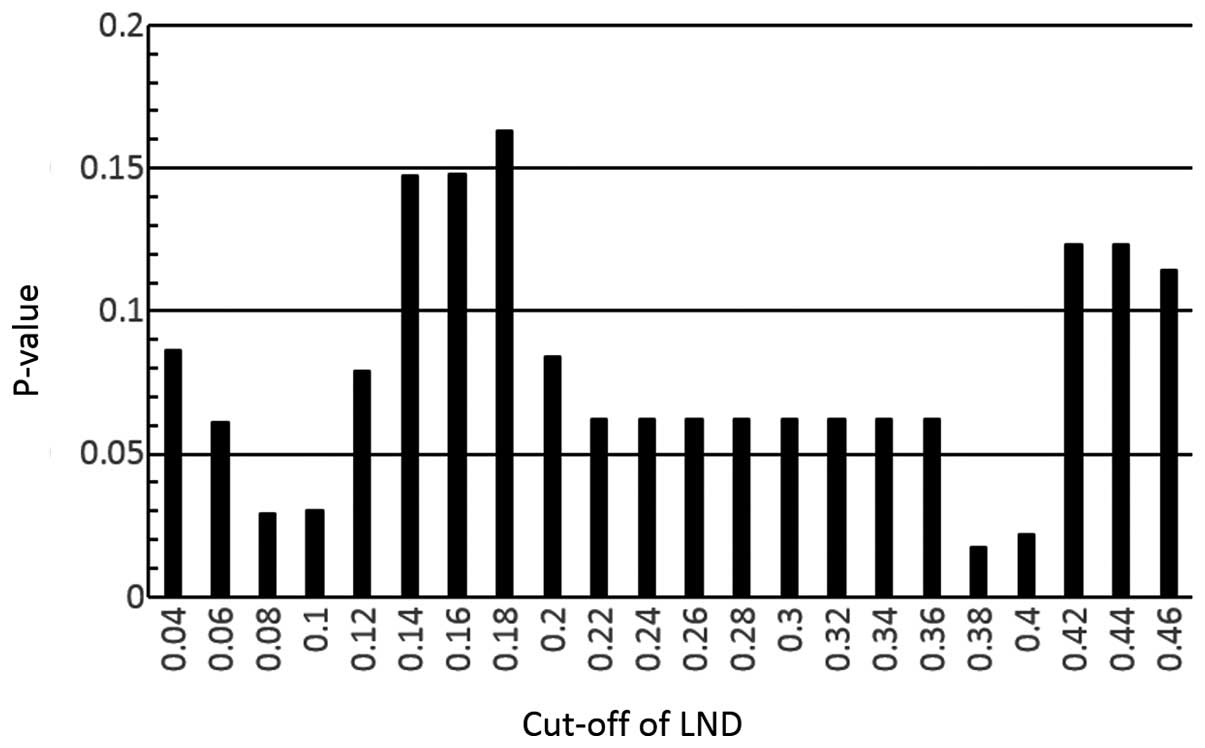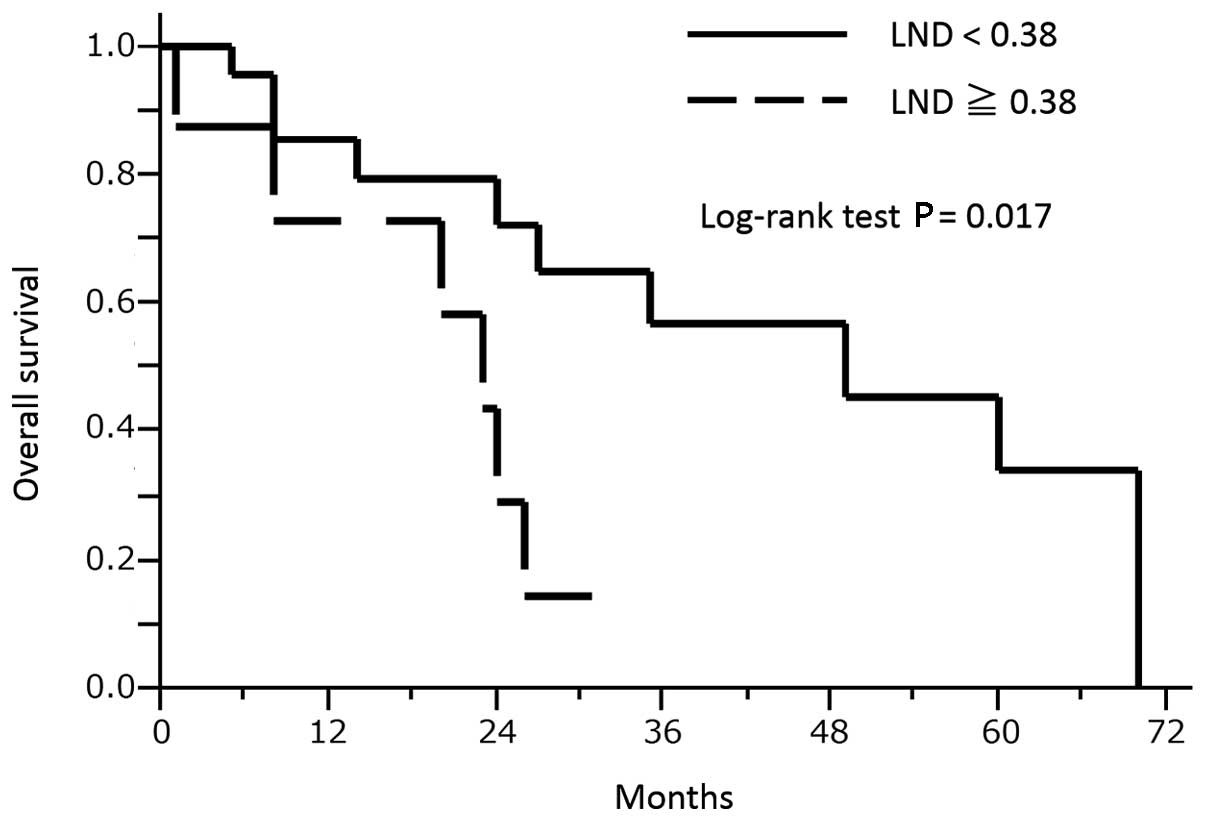|
1
|
Ettl T, Schwarz-Furlan S, Gosau M and
Reichert TE: Salivary gland carcinomas. Oral Maxillofac Surg.
16:267–283. 2012. View Article : Google Scholar : PubMed/NCBI
|
|
2
|
Barnes L, Eveson JW, Reichart P and
Sidransky D: World Health Organization classification of tumours.
Pathology and genetics of head and neck tumours (Lyon). IARC Press.
2005.
|
|
3
|
Okabe M, Miyabe S, Nagatsuka H, Terada A,
Hanai N, Yokoi M, Shimozato K, Eimoto T, Nakamura S, Nagai N, et
al: MECT1-MAML2 fusion transcript defines a favorable subset of
mucoepidermoid carcinoma. Clin Cancer Res. 12:3902–3907. 2006.
View Article : Google Scholar : PubMed/NCBI
|
|
4
|
Amit M, Na'ara S, Sharma K, Ramer N, Ramer
I, Agbetoba A, Glick J, Yang X, Lei D, Bjoerndal K, et al: Elective
neck dissection in patients with head and neck adenoid cystic
carcinoma: An international collaborative study. Ann Surg Oncol.
22:1353–1359. 2015. View Article : Google Scholar : PubMed/NCBI
|
|
5
|
Patel SG, Amit M, Yen TC, Liao CT,
Chaturvedi P, Agarwal JP, Kowalski LP, Ebrahimi A, Clark JR, Cernea
CR, et al: Lymph node density in oral cavity cancer: Results of the
International Consortium for Outcomes Research. Br J Cancer.
109:2087–2095. 2013. View Article : Google Scholar : PubMed/NCBI
|
|
6
|
Kim SY, Nam SY, Choi SH, Cho KJ and Roh
JL: Prognostic value of lymph node density in node-positive
patients with oral squamous cell carcinoma. Ann Surg Oncol.
18:2310–2317. 2011. View Article : Google Scholar : PubMed/NCBI
|
|
7
|
Gil Z, Carlson DL, Boyle JO, Kraus DH,
Shah JP, Shaha AR, Singh B, Wong RJ and Patel SG: Lymph node
density is a significant predictor of outcome in patients with oral
cancer. Cancer. 115:5700–5710. 2009. View Article : Google Scholar : PubMed/NCBI
|
|
8
|
Amar A, Rapoprt A, Curioni OA, Dedivitis
RA, Cernea CR and Brandáo LG: The density of metastatic lymph node
as prognostic factor in squamous cell carcinoma of the tongue and
floor of the mouth. Braz J Otorhinolaryngol. 78:86–90. 2012.(In
Portuguese). View Article : Google Scholar : PubMed/NCBI
|
|
9
|
Liao CT, Hsueh C, Lee LY, Lin CY, Fan KH,
Wang HM, Huang SF, Chen IH, Kang CJ, Ng SH, et al: Neck dissection
field and lymph node density predict prognosis in patients with
oral cavity cancer and pathological node metastases treated with
adjuvant therapy. Oral Oncol. 48:329–336. 2012. View Article : Google Scholar : PubMed/NCBI
|
|
10
|
Rudra S, Spiotto MT, Witt ME, Blair EA,
Stenson K and Haraf DJ: Lymph node density - prognostic value in
head and neck cancer. Head Neck. 36:266–272. 2014. View Article : Google Scholar : PubMed/NCBI
|
|
11
|
Kassouf W, Leibovici D, Munsell MF, Dinney
CP, Grossman HB and Kamat AM: Evaluation of the relevance of lymph
node density in a contemporary series of patients undergoing
radical cystectomy. J Urol. 176:53–57. 2006. View Article : Google Scholar : PubMed/NCBI
|
|
12
|
Ooki A, Yamashita K, Kobayashi N, Katada
N, Sakuramoto S, Kikuchi S and Watanabe M: Lymph node metastasis
density and growth pattern as independent prognostic factors in
advanced esophageal squamous cell carcinoma. World J Surg.
31:2184–2191. 2007. View Article : Google Scholar : PubMed/NCBI
|
|
13
|
Sobin LH, Wittekind C and Gospodarowicz M:
International Union Against Cancer TNM classification of malignant
tumours (7th). New York, NY, USA: Wiley-Blackwell. 2009.
|
|
14
|
Hasegawa Y and Saikawa M: Update on the
classification and nomenclature system for neck dissection:
Revisions proposed by the Japan Neck Dissection Study Group. Int J
Clin Oncol. 15:5–12. 2010. View Article : Google Scholar : PubMed/NCBI
|
|
15
|
Van Baardwijk A, Dooms C, van Suylen RJ,
Verbeken E, Hochstenbag M, Dehing-Oberije C, Rupa D, Pastorekova S,
Stroobants S, Buell U, et al: The maximum uptake of
(18)F-deoxyglucose on positron emission tomography scan correlates
with survival, hypoxia inducible factor-1alpha and GLUT-1 in
non-small cell lung cancer. Eur J Cancer. 43:1392–1398. 2007.
View Article : Google Scholar : PubMed/NCBI
|
|
16
|
Suzuki H, Kato K, Fujimoto Y, Itoh Y,
Hiramatsu M, Naganawa S, Hasegawa Y and Nakashima T: Prognostic
value of (18)F-fluorodeoxyglucose uptake before treatment for
pharyngeal cancer. Ann Nucl Med. 28:356–362. 2014. View Article : Google Scholar : PubMed/NCBI
|
|
17
|
Suzuki H: Lymph node density is a
prognostic factor in patients with major salivary gland carcinoma.
Asia-Pacific Journal of Clinical Oncology. 10:1–264. 2014.
|

















